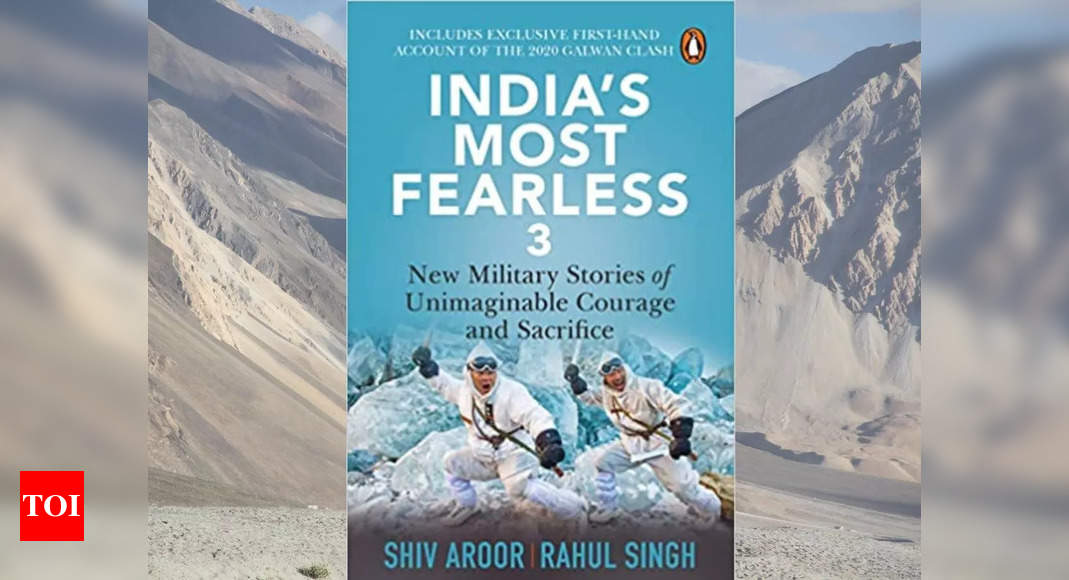Excerpt: A first-hand account of the 2020 Galwan clash in Ladakh – Times of India
Here we share an exclusive excerpt from the book on the first-hand account of the 2020 Galwan clash between the Indian and Chinese soldiers in Ladakh. This excerpt from ‘India’s Most Fearless 3’ by Shiv Aroor and Rahul Singh, is published with permission from Penguin eBury Press.
‘India’s Most Fearless 3’ by Shiv Aroor and Rahul Singh
Even above the loud, steady roar of the Galwan River, he heard the thundering footfalls. The sound of over a thousand men reverberating through the darkness, amplified by the tunnel effect of a narrow valley flanked by steep rising mountains on both sides. Peering into the black void beyond Patrol Point 14, lit only a few metres forward by hand-held torches, the reality of those sounds dawned on Havildar Dharamvir Kumar Singh of the Indian Army’s 16 Bihar infantry battalion. He clenched his eyes briefly shut to soak in every vibration. When he opened them again, he knew that the huge horde of men
advancing towards his position was not marching.
They weren’t even jogging.
They were sprinting.
‘There were less than 400 of us,’ says Havildar Dharamvir. ‘We would soon discover that the number of Chinese Army soldiers running towards us was maybe three times that. We had been fighting smaller numbers of Chinese for two hours before that. But this was their main force. The all-out assault that the Chinese side was launching against us.’
An all-out assault.
Unarmed, as stipulated by decades-old protocol between the two armies, Havildar Dharamvir quickly glanced around at the soldiers with him. Even in the darkness he could tell their expressions. A curious mix of determination and fearlessness, but tinged with an edge of foreboding.
As the soldiers steeled themselves, rallied by their commanding officer and a group of younger officers, Havildar Dharamvir knew what lay ahead would need every ounce of strength the smaller force could muster. But it also made one particular man in the team even more crucial.
A non-combatant with a white suitcase.
Wading through the group of soldiers with him, Havildar Dharamvir emerged on the banks of the gushing Galwan, right where he had last seen the man he was looking for now. With a big, unmistakable red ‘plus’ sign painted on to his parka, Naik Deepak Singh wasn’t standing. On his knees, his suitcase open with bandages and bottles of tincture, he was crouched over what appeared to be a small group of injured men, all groaning in the darkness. Three were Indian soldiers
being administered first aid.
The six other soldiers receiving emergency ministrations from the young Indian Army medic weren’t Indian soldiers. They were Chinese Army personnel. Two People’s Liberation Army (PLA) officers and four jawans.
‘They are badly injured. They need to rest,’ Naik Deepak said before Havildar Dharamvir could ask. An hour earlier, the injured Chinese soldiers had been left behind by their retreating force. Naik Deepak, the young nursing assistant, had been summoned to Patrol Point 14 by his commanding officer two hours earlier. Not he, not Havildar Dharamvir and not his commanding officer knew then how crucial his crouched figure would be in the events of that night.
‘Is that your blood?’ Havildar Dharamvir bent down over Naik Deepak, inspecting a gash just above the nursing assistant’s right eyebrow.
‘It’s nothing. A piece of rock hit me. It’s superficial. Main theek hoon [I am fine],’ said Naik Deepak as he finished bandaging one of the Chinese soldiers, a young man whose face was covered with streams of blood from a head injury.
A short distance behind, at a point where the north-flowing Galwan River abruptly bent westward, Colonel Bikkumalla Santosh Babu, commanding officer of the battalion, had been alerted to the sounds of the Chinese advance. As he began to summon reinforcements and rally his much smaller force
to face the arrival of the much larger Chinese advance, one thing was certain to him. No matter what transpired next in that desolate, ravine-like valley at 13,000 feet in Ladakh’s Himalayan heights, history had already been made with blood and bone that day.
As word of the lethal Galwan Valley incident shocked the world at 12.21 p.m. the following day, most would see it as a spontaneous flare-up that had ended a healthy forty-five-year run of zero fatal casualties on the India–China frontier. But waiting in the darkness on the banks of the Galwan River
the previous night, Naik Deepak and Havildar Dharamvir knew that nothing, including that advancing horde of Chinese soldiers, was unplanned.
READ MORE: 3 books TV actress Shweta Tiwari read in August
For all the latest lifestyle News Click Here

